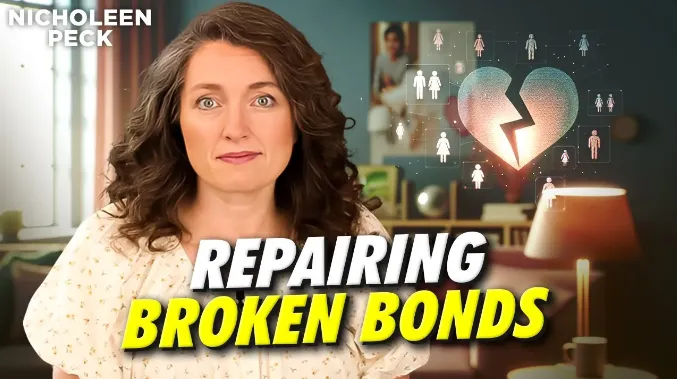
Opposing Viewpoints: Adult Children Cutting Off Their Parents 2.0 (Boundaries vs. Bolstering)
Understanding the Dynamics: Adult Children Cutting Off Parents
Are you ready to delve into some opposing viewpoints? This discussion centers on adult children cutting off their parents. In this video, we'll explore the difference between creating boundaries and bolstering. I'm Nicholeen Peck, and I teach parenting worldwide, focusing on effective communication, building strong family bonds, child development, and education. Today, we'll examine the parent-child bond and the communication that occurs as children transition into adulthood.
Several months ago, I released a video titled "Why Are Adult Children Cutting Off Their Parents?" It quickly garnered a lot of attention, with many viewers expressing gratitude, saying it was just what they needed. However, it also received criticism. Some viewers felt the video dismissed the reality of abusive or narcissistic parents. In this follow-up, I aim to address those opposing viewpoints and share new insights I've gained from recent interactions with parents and a bestselling book that offers a fresh perspective on this issue.
The Growing Trend of Estrangement
In the original video, I discussed the increasing phenomenon of adult children cutting off their parents. While it's natural for young adults to seek autonomy and make their own life decisions, there seems to be a growing trend where children are not only distancing themselves but completely severing ties with their parents. This estrangement often extends to preventing grandparents from having relationships with their grandchildren, which can be detrimental to the next generation. Data suggests that children benefit from interactions with their grandparents, even if they aren't perfect, as it helps them develop a healthier sense of self and problem-solving skills.
The overwhelming response to the original video, both positive and negative, highlights the prevalence of this issue. It's not just a Western phenomenon anymore; it's spreading globally, influenced by media and cultural shifts. This detachment is a complex experiment with potentially severe consequences for families.
The Role of Technology and Misleading Messages
In the previous video, I touched on how technology contributes to this detachment. Online messages often portray parental authority as an attack on personal freedom. While it's healthy for young adults to make independent decisions, the notion that parents are controlling or narcissistic simply because they care or offer advice is misleading and dishonest. Although there may be cases of narcissistic or emotionally immature parents, controlling them is not a viable solution. This control often leads to isolation, a lack of support, and a false sense of identity as young adults detach from their family history.
The Importance of Disagreeing Appropriately
One crucial skill in maintaining family relationships is disagreeing appropriately. It's possible to have different viewpoints without severing ties. Healthy relationships can withstand emotional outbursts and bad behavior. Parents have always navigated their children's bad behavior, so they can handle disagreements. It's essential to maintain open lines of communication, even if it means addressing uncomfortable topics.
For instance, if a parent criticizes you harshly, it's okay to express your displeasure and end the conversation temporarily. But it's equally important to reconnect and not let one incident define the entire relationship. Avoid letting fragile emotions break strong family bonds.
Insights from "Bad Therapy" by Abigail Schreyer
A recent book, "Bad Therapy" by Abigail Schreyer, sheds light on why adult children are distancing themselves from their parents. Schreyer, a well-researched journalist, presents compelling arguments against coddling, which she believes is damaging children and contributing to estrangement. While I don't agree with everything in her book, her insights on therapeutic culture are worth considering.
Therapy, while beneficial in many cases, can sometimes harm family relationships. Parents often assume therapy will solve all problems, but it can inadvertently send the message that parents are incapable of helping their children. This undermines parental authority and promotes dependency on therapists. Furthermore, therapy sessions often focus on negative aspects of life, reinforcing a victim mentality rather than fostering resilience and problem-solving skills.
Rethinking Therapy and Strengthening Family Bonds
If therapy hasn't strengthened your relationship with your child, it might be worth reconsidering its role. Honest conversations about the impact of therapy on family dynamics are crucial. Encourage your child to discuss issues directly with you instead of venting to a therapist who hasn't met you. Misdiagnoses and unfounded labels can harm relationships.
To navigate this complex issue, both parents and adult children must cultivate a mindset of understanding and resilience. Setting boundaries is essential, but using them to control relationships can lead to further estrangement. Instead, focus on open communication, mutual respect, and the willingness to work through differences.
For more strategies on improving family relationships, explore resources on this channel. A recommended next step is watching "The Expectation Trap vs. The Cycle for Success," which addresses how unrealistic expectations can harm relationships and offers practical solutions for fostering healthier dynamics.
In summary, understanding the dynamics of adult children cutting off parents requires a multifaceted approach. By addressing opposing viewpoints, rethinking the role of therapy, and focusing on effective communication and resilience, families can navigate this challenging terrain and work towards healing and stronger connections.

